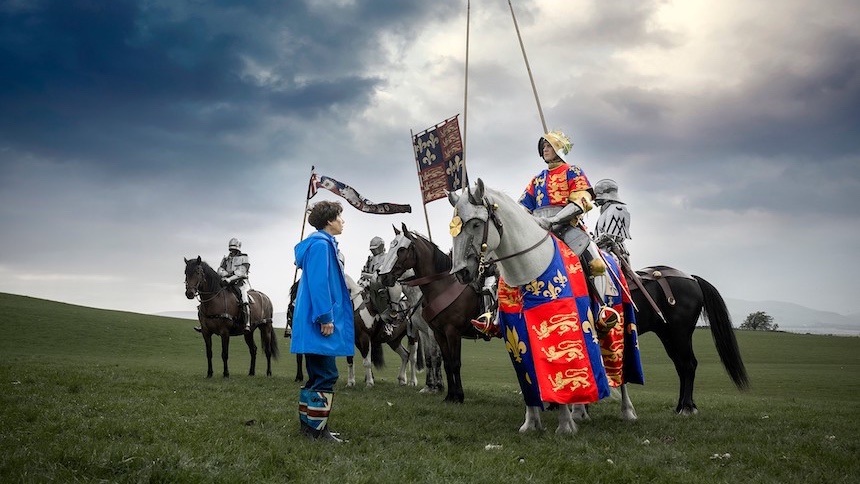THE LOST KING Review: Sally Hawkins Shines in Unfocused Romantic Fantasy
Stephen Frears directed the film, now in theaters.

It’s difficult, though not exactly impossible, to describe The Lost King, director Stephen Frears (Philomena, The Queen, Dangerous Liaisons) and co-screenwriter/producer/actor Steve Coogan’s adaptation of Philippa Langley and Michael Jones’s 2013 book, “The King's Grave: The Search for Richard III,” as historical revisionism, romantic fantasy, or simply a comedy-drama centered on the literally groundbreaking discovery of Richard III’s remains, long thought lost and thus unrecoverable, in a nondescript carpark in Leicester, England.
It’s all those and — paradoxically — less, an unironic, uncritical ode to the peculiarly British preoccupation with lineages, birthrights, and, of course, the centuries-old monarchy.
The word “peculiar” could also apply to the lightly fictionalized character at the center of The Lost King. When we first meet Philippa Langley (Sally Hawkins), a mid-level drone at a mid-tier, Edinburgh-based marketing firm, mother of two teens, Raife (Benjamin Scanlan) and Max (Adam Robb), and estranged wife to John (Steve Coogan), she’s at a major personal and professional funk, a mid-life crisis of sorts, exacerbated by chronic fatigue syndrome, a sexist, agist manager at work, and an otherwise unfulfilling life, doomed in her eyes, to anonymous mediocrity.
She never says it outright, but she’s clearly meant for bigger and better things, eventually finding both in the search for Richard III’s final resting place. Spurred — at least in this onscreen iteration — by William Shakespeare’s play about the doomed, short-lived monarch and the calumnies she perceives in Shakespeare’s depiction of the last Plantagenet monarch, Philippa takes a deep dive into the popular historical record, initially purchasing whatever she can find at a local bookseller (eight different titles) before expanding her research into more academic strongholds (i.e., libraries) and joining the local Richard III Society, a social group casually interested in rehabilitating Richard III’s negative image in the popular imagination while downing a pint or four at the local pub.
For Philippa, however, finding the remains of Richard III becomes an all-consuming passion. Unsurprisingly, she begins to neglect her work and family, though her family, especially John, start to come around, seeing her obsession with Richard III as a net positive they should actively encourage and support. That leaves little time for her unfulfilling work life, an element The Lost King elides entirely, though it’s strongly suggested her devotion to locating Richard III’s remains makes her unemployable.
Wherever and however she survives financially, it’s of secondary importance, as The Lost King keeps its focus singularly on Philippa and her lone, seemingly mad pursuit. After countless rejections, she finally gets a sit-down with a university-based archeologist, Richard Buckley (Mark Addy), who, like practically every academic before and after, sees Philippa as an amateur whose theories aren’t worthy of time or effort.
That changes, though, when university funding dries up and Buckley sees Philippa’s project as a means toward an end: Keeping himself and his staff employed in an archeological pursuit, regardless of its quixotic.
Throughout, one-time iconoclast Frears and Coogan play underdog tropes and conventions to near perfection. The audience sides with the underseen, underappreciated Philippa almost immediately. Every obstacle, from the institutional to the patriarchal, also compel us to side with Philippa and her project. And with Hawkins, one of the most talented, expressive actors of her generation as Philippa, it’s even easier to sympathize and empathize with her character’s improbable quest for self-fulfillment through monarchical restoration.
At no time are we, the audience, expected to question the nature of that pursuit or whether Richard III, vilified as the murderer of the “princes in the tower” for half a millennia, deserves more than passing interest or engagement. It’s assumed, baked into the premise.
With Philippa as a lonely, if dedicated, researcher, Frears, Coogan, and co-screenwriter Jeff Pope take the obvious tack of turning Philippa’s imaginative reconstruction of Richard III (Harry Lloyd) as a physical, tangible presence in her life, first as a silent observer and later as an active participant in Philippa’s emotional and mental life, offering guidance here and there, but running off in a huff when she, like every historian, amateur or otherwise, broaches the question of the princes in the tower and their respective fates.
Like much else about Richard III, it’s left unresolved, a question unlikely to be answered one way or another more than 500 years after the British monarch’s brief, violent reign. Like virtually every “based on a true story” narrative, The Lost King ends with not one, but two titles cards, one noting Richard III’s recognition as a “rightful” ruler and no longer an usurper, and the second Langley’s post-search recognition, specifically an MBE (Most Excellent Order of the British Empire) for her services to the crown and the recovery, exhumation, and re-burial of Richard III.
The Lost King is now playing in movie theaters throughout North America.
The Lost King
Director(s)
- Stephen Frears
Writer(s)
- Steve Coogan
- Philippa Langley
- Jeff Pope
Cast
- Sally Hawkins
- Shonagh Price
- Helen Katamba







